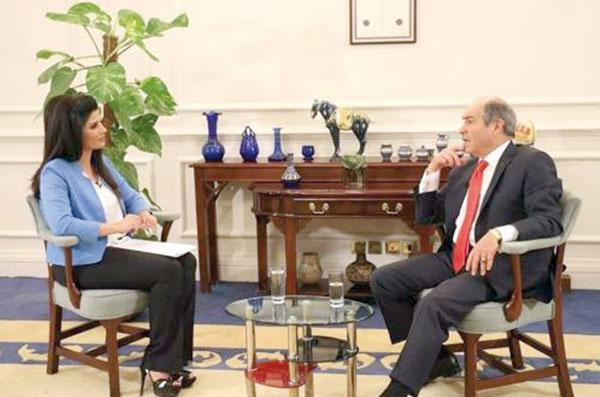You are here
Economy is ‘on right track’ — Mulki
By JT - Jul 16,2016 - Last updated at Jul 16,2016

Prime Minister Hani Mulki speaks to Jordan TV presenter Abeer Zaben on 60 Minutes on Friday (Photo courtesy of Prime Ministry)
AMMAN — The government is committed to holding transparent parliamentary elections that reflect the political reforms Jordan has been implementing for several years, Prime Minister Hani Mulki said on Friday.
Mulki said the government would fully support the Independent Election Commission (IEC) to help it run the September 20 polls smoothly and to encourage citizens to participate and cast their votes, to make them real partners in decision making.
In an interview with Jordan Television’s 60 Minutes, the premier said that the IEC is in charge of administering every aspect of the elections, while the government’s role is to provide support to help the commission achieve its goals, the Jordan News Agency, Petra, reported.
As for the Decentralisation Law, Mulki said it will allow citizens in governorates to set expenditure priorities for the projects they need.
The premier described the new law as an important step for Jordanians, noting that citizens themselves were most aware of the needs in their own areas.
Decentralisation will achieve the envisioned development in governorates, he added.
Commenting on the economic situation, the prime minister said it is “not catastrophic”, adding that there could be successful solutions to address the economy quickly, especially as the growth rate reached 2.8 per cent this year.
The economy suffers from a high debt rate, but what matters is the ability to repay it, which is the ratio of the debt compared to the gross domestic product (GDP), and this has reached some 93 per cent, Mulki highlighted.
Investments and plans to increase the GDP are needed, he said.
These can be achieved through grants and loans or from citizens, the premier said, noting that the international community cannot provide grants without the contributions of citizens.
The government’s procedures were designed not to affect the lower middle class or those with limited incomes, Mulki said, noting that taxes were imposed on secondary products, such as perfumes and watches, which affected those with higher incomes.
The premier stressed there would be no increase in the prices of bread, water or electricity.
According to Jordan’s agreement with the International Monetary Fund (IMF), the price of electricity should have been increased when the price of oil reached $45 a barrel.
The price of oil per barrel is currently $47, and electricity prices should have been raised over the last month, but the government negotiated with the IMF and agreed that the oil price could reach $55 before the price of electricity is increased, Mulki said.
The premier said the Jordan Investment Fund (JIF), which was established through a recently endorsed law, would replace the government as the manager of investment-related issues, such as allocating land, exemptions and facilities.
Under the fund law, the JIF must be established and listed on the Amman Stock Exchange as a public shareholding company, with Saudi Arabia as the biggest shareholder, and it will implement projects that bring good revenues and serve citizens.
Meanwhile, the government has allocated JD25 million to address poverty and unemployment, Mulki said. The premier highlighted the importance of employment loans on offer from the government and urged young people to benefit from them, noting that the application process is quick and easy.
The government is currently preparing for the next budget, and is “on the right track” despite difficult circumstances, he added.
Discussing the Kingdom’s relations with Gulf Arab states, Mulki said these ties “have always been unique” thanks to His Majesty King Abdullah’s efforts and the diplomatic work of the Foreign Ministry.
He cited the Gulf grant that had a “great effect” developing the Kingdom’s infrastructure and implementing several important projects.
As for the impact of regional conditions on Jordan, the premier said the Kingdom sought to apply political solutions rather than violence, noting that Jordan had always called for political procedures to support the humanitarian dimension in addressing conflicts.
Related Articles
AMMAN — Prime Minister Hani Mulki on Friday stressed the twin local elections held on Tuesday represent a milestone in the comprehensive ref
AMMAN — The government is working to support the Independent Election Commission (IEC) to hold the municipal and governorate council electio
AMMAN — Prime Minister Hani Mulki on Thursday met with the Lower House's Democratic Bloc as part of a series of meetings with lawmakers to d












